“What makes a good board member?… interesting choice of question,” ponders Ms Bernadette, Chairperson for the Secondary School Board at Smith Campus.
Sitting on her porch, relaxed and poised, Ms Bernadette shares her experience.
“I’m a retired public officer. I worked as an education administrator in the government for 41 years and I believe with this background and experience, I have been privileged to chair the board at Smith Campus since 2017,” she says with a smile.
The School of St Jude complies with statutory requirement by operating under three boards; Primary School Committee for the registered primary school and Secondary School Board for each of the registered secondary schools at St Jude’s. These bodies are made up of staff, parents and local community representatives and professionals from different background.
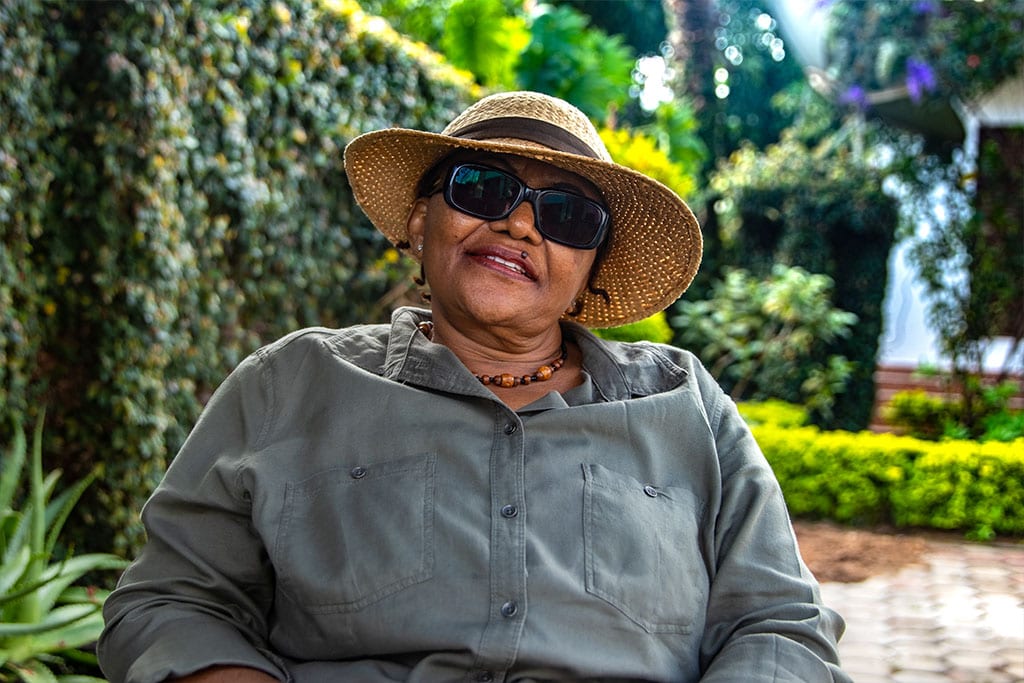
“I remember I was one of the three people who cut the cake when Gemma first opened the school gates back in 2002. It was a really special day for me and especially for Gemma,” she chuckles.
“I was the District Education Officer then so oversaw many schools in my district and was excited to see a new school opening for our community,” she adds.
With a background in education, Ms Bernadette has been a great asset to the school, leading the board with passion, firm principles and making sure the school adheres to Tanzania education policy.
“My role as the St Jude’s Secondary Board Chairperson is to make sure that the meetings are held on time. We are supposed to have four meetings a year… two board meetings and two committee meetings,” Ms Bernadette explains.
“Some of the key points of discussion when we meet include secondary school systems,” Ms Bernadette explains,
“We make sure that systems are followed and run properly as we work towards our mission of giving bright, poor Tanzanian students a free, quality education so they can break the cycle of poverty in their communities,” she adds.
The Secondary School Board, of which Ms Bernadette is Chair, ensure that the school’s mission and policies are followed, and make recommendations in relation to Tanzanian Education Policy and ensure the enforcement of the Child Protection Policy to the Tanzania based board of non-governmental organisation (NGO) Directors overseeing the whole project. They also support the management and ensure that strategic goals are being achieved within specific timeframes.
The NGO Board then liaises with our international charity boards both in Australia (SOSJ Ltd Australia) and America (AFOSJ).
“What makes a good chairperson is attending board and other meetings on time and always thinking of the benefit you bring to the school.
“Any good leader must have a vision. You need to see where that vision is heading and walk towards that goal. And that’s what keeps me going to continue serving the board,” she adds.
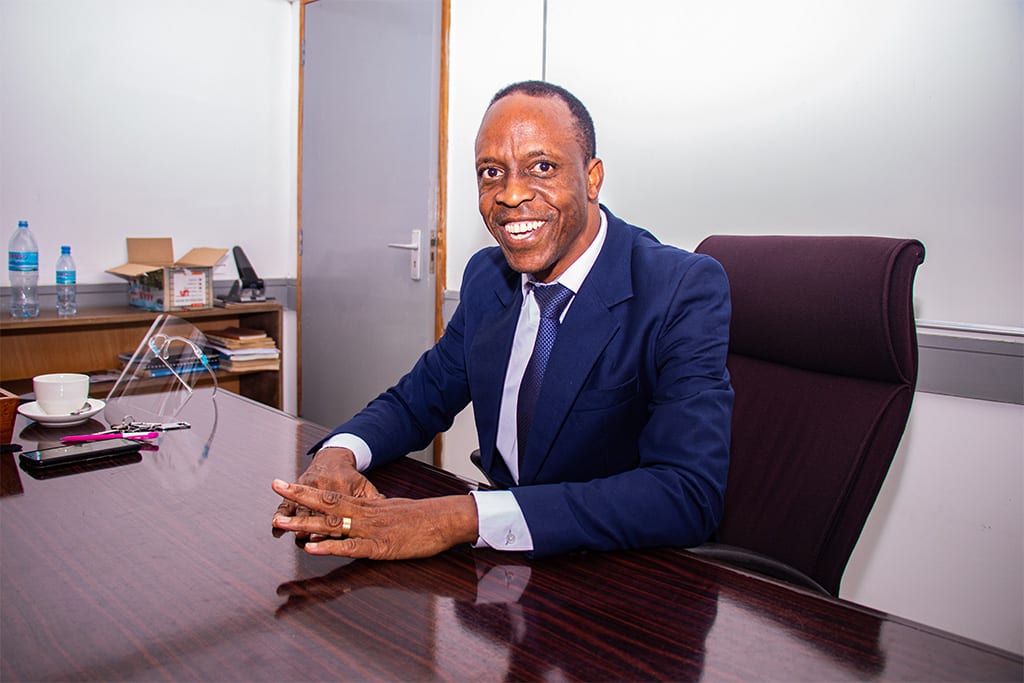
Agreeing with Ms Bernadette is Professor Lucky, who serves as a board member for the Secondary School Board at Smith Campus. He believes any good leader must have a vision and must be able to empower the people working with them.
Being a finance and accounting expert, Professor Lucky advises and shares his financial knowledge with the school's management and board to ensure full financial compliance.
“My role as a board member is to advise the board on various issues, including financial matters, governance and leadership of the school,” says Professor Lucky.
Professor Lucky, who is also an author of various books about finance and accounting, believes a combination of skills is key in maintaining a good board.
“When you meet at board level, you’re multiple skills and experience give you the know-how to advice in different areas,” he advises.
Both Professor Lucky and Ms Bernadette have been active members of the Secondary School Board at Smith Campus for years and their stewardship together with other members of their board has set the direction in sustaining and achieving St Jude’s mission.
Tatu, a caring and loving student in her final year of secondary school at Smith Campus, felt compelled to help the newly enrolled students with their transition into secondary school at St Jude’s. With hopes to provide the warmest welcome to these new students, Tatu wrote a Student Mentorship Program proposal and presented it to her teacher.
“Initially, a few students got together and started helping and mentoring all the new students coming into the campus. However, this year I took it upon myself to write and present this mentorship program to make it official and recognised by the school administration,” Tatu explains.
The Student Mentorship Program provides an easy transition and academic support for newly enrolled Form 1 boy students at Smith Campus. Part of the program is to assist in teaching English to the new students so they can communicate and adapt to an English-medium school with ease.
“I shared and presented the proposal to both the Career Guidance and English Departments. The teachers looked at the proposal and gave me the go ahead to execute the program,” Tatu says.
In the proposal, Tatu suggests that the volunteering students from Form 5 and 6 should, supervise and be responsible for several new Form 1 students.
“This year we have a total of 78 new Form 1 boy students. It’s a big group, so we’ve divided them into several groups. Each volunteer supervises a group of between six and eight students.”
As a leader of the program, Tatu makes sure that all volunteer students are guided and are able to manage the progress of each of the new students within their group.
“I prepare lesson plans. Once the lesson plan is approved by the Language Department, I share the plans with the rest of the students who are assisting with the mentorship. The plans are then distributed to the new students.”
“We use after school hours and the weekends to teach the new students. We also give them different assignments. One of the assignments is to do presentations in front of the class. This is to help them build their confidence and we also get to assess their progress,” she further explains.
Being a Form 6 student, Tatu is looking forward to doing her final exams. But, more importantly she is excited to see how all the new students will perform in six months with written and spoken English after successful completion of the mentorship program.
“As a leader of this program, I go around each group and seek students who perhaps take longer to understand and I have a one-on-one lesson with them. The aim is to make sure that, after the first three months, all these students are competent in English, confident and have settled in.”
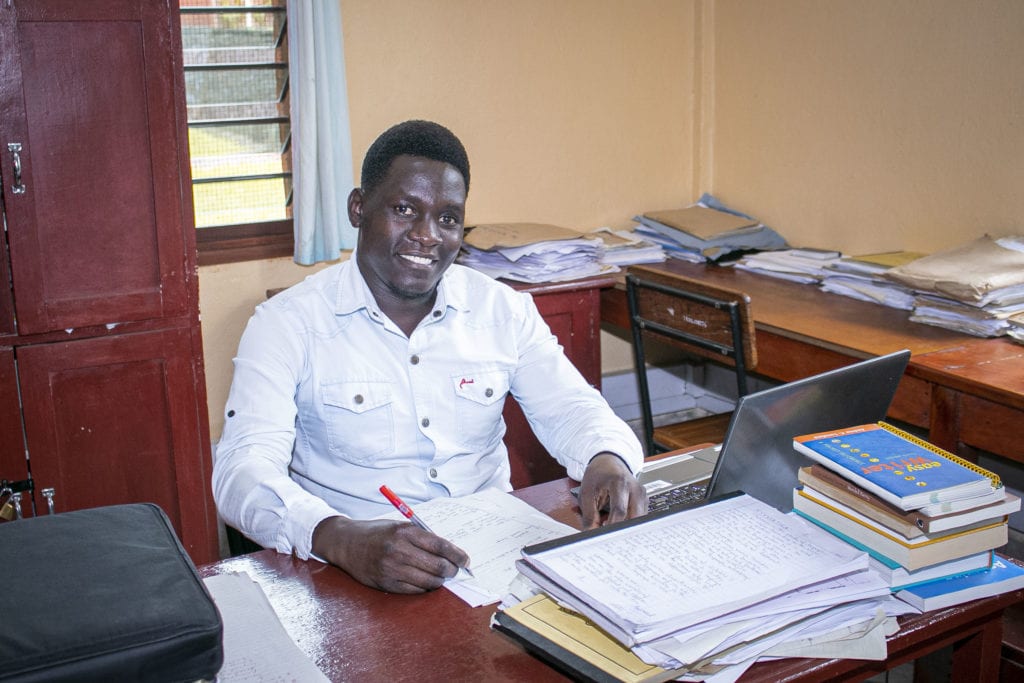
Commending Tatu for pioneering the mentorship program is Mr Mollel, Head of Languages Department, after receiving the proposal from her.
“The Form 1 students we select and enrol from government schools hardly speak English. As teachers, we have to make sure they have the command of the language within six months. That’s why, when Tatu brought us this proposal and presented the modality of the program, we accepted it,” Mr Mollel proudly states.
“Students spend most of the time with their fellow students, so it’s easy for senior students to mentor and guide the new ones,” he added.
Explaining the differences between the set academic program and Tatu’s initiative, Mr Mollel says, “The difference between our academic program and the new proposal is that this initiative has taken a social approach, whereby senior students have more time with the new students… after school hours and on weekends.”
The academic department supports the program by providing books, study materials and assisting in creating and approving lesson plans. Mr Mollel believes that the mentorship project will help the new students learn the language, communicate and settle in more quickly.
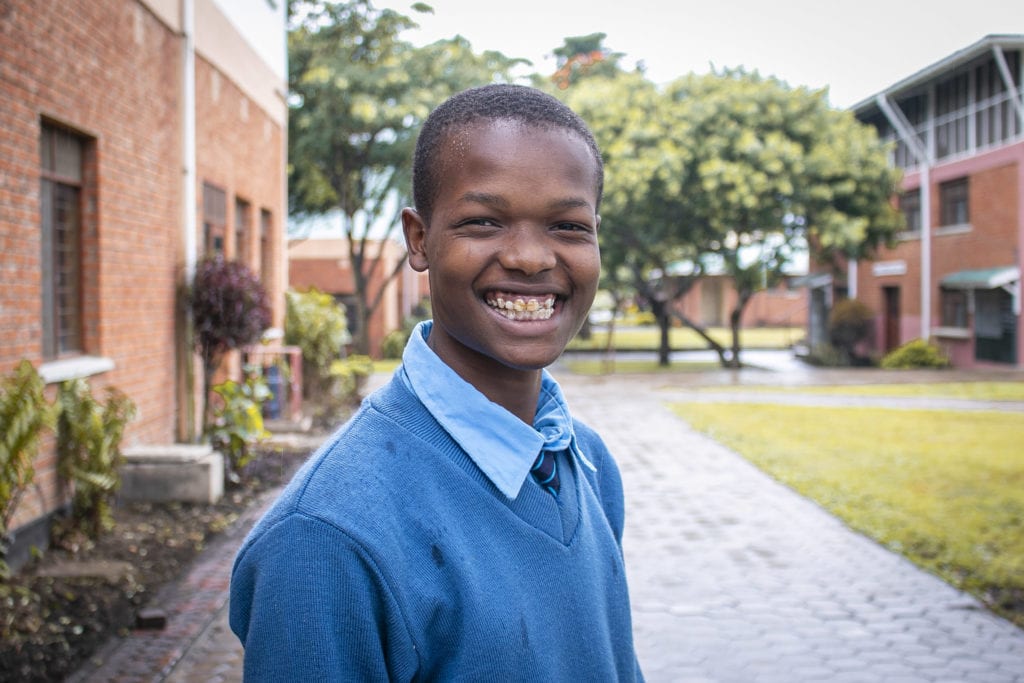
Daniel who joined Form 1 beginning of this year, is a mentee in the program. He’s committed to speaking English and be able to communicate with his peers with confidence.
“I’m still learning the language. Tatu challenges and pushes me to do better and that makes me eager to want to learn more. I hope to be speaking English well by the end of this program.”
Aside from the language lessons, the program aims to engage and teach the new students school values.
“Tatu has taught me to follow the values of the school… Respect, Responsibility, Honesty and Kindness. Her advice is to always put my head down and study hard so I can achieve my goals,” Daniel said.
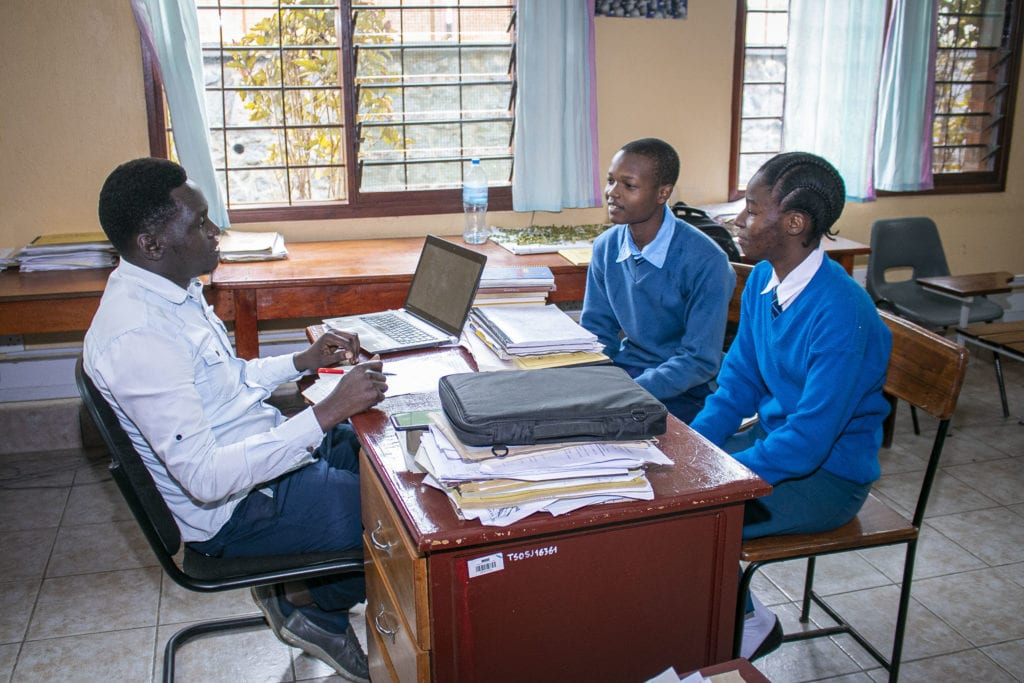
St Jude’s is an English-medium school and it’s committed to making sure that students understand and can communicate effectively in the English language by the time they graduate; nurturing well-rounded future leaders of Tanzania.
***Daniel’s quotes were translated from Kiswahili to English.
Always smiling and ready to welcome you into his office is Mr Tsingay, Deputy – Academics and Registration at Smith Campus. He’s been working for St Jude’s for more than seven years and says he’s never had a dull moment.
“A day at St Jude’s is usually very short and very busy. We have many students and, for that reason, we have many subjects to teach and things to do; I can confidently say more than any school I’ve ever worked for,” Mr Tsingay says.
As well as being a Deputy, Mr Tsingay also teaches geography; a wearer of many hats must therefore have their day meticulously planned.
“Before I leave home, I make sure my day is well planned and I have my to-do list ready. I’ve created a to-do list template that I use every day which helps me plan on a weekly and monthly basis,” Mr Tsingay describes.
He adds, “Apart from the regular classes that I serve, I also have other duties that I have to complete in the Academics and Registration Department.”
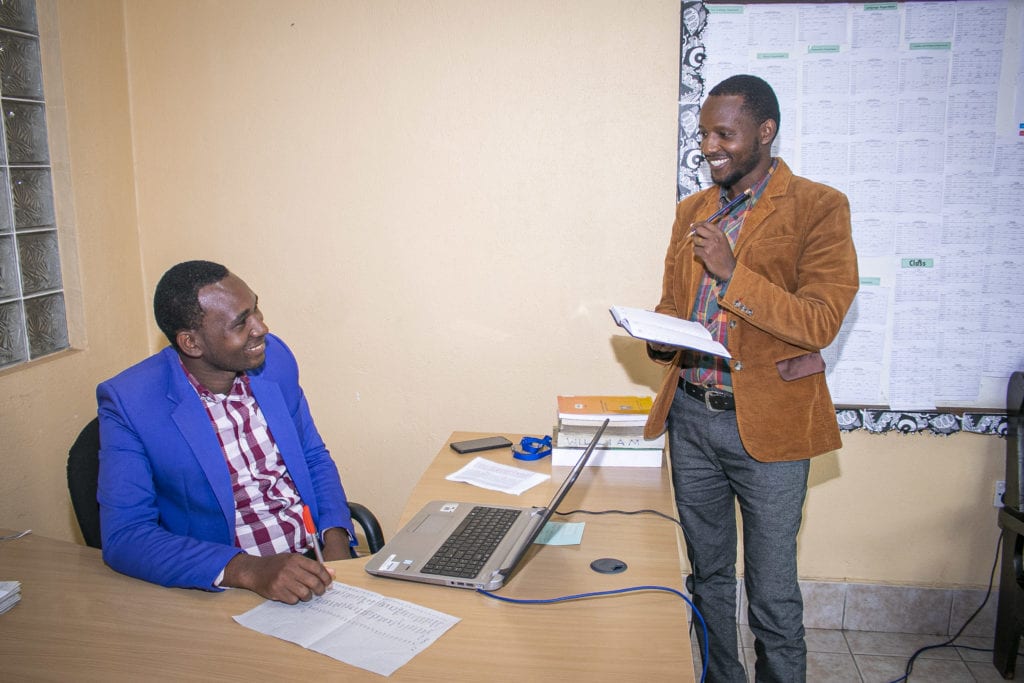
Depicting his regular day at St Jude’s, Mr Tsingay says that it includes making sure the teaching and the learning process runs smoothly.
“I have to make sure teachers and students are in classes, the timetable is ready for everyone to respect and follow and to ensure all exams are done as per the timetable created,” Mr Tsingay explains.
He further adds, “My role doesn’t end there, I’m also responsible for the professional development of our staff. The staff have to be regularly updated with information. I also make sure students are being registered and identified by the Tanzania National Examination Board.”
Mr Tsingay remains motivated throughout his journey here at St Jude’s and his source of drive comes from his love of research.
“Doing research is my passion. Research is all about evaluation and results and that’s what keeps me going. For instance, by evaluating our performance’s strengths and weaknesses, it gives us a sense of direction of where we need to head to get a successful outcome,” he exclaims.
St Jude’s has teachers and Head Office staff from different walks of life, and it’s this diversity that first attracted Mr Tsingay to join the school.
“The diversity of students and staff is amazing at St Jude’s. Everyone here is from different parts of the country and the world, with different educational backgrounds and nationalities. Meeting people from different cultures and backgrounds has helped me gain the experience I have today. Learning through apprenticeship has built me to be who I am and has kept me moving,” Mr Tsingay says with a smile.
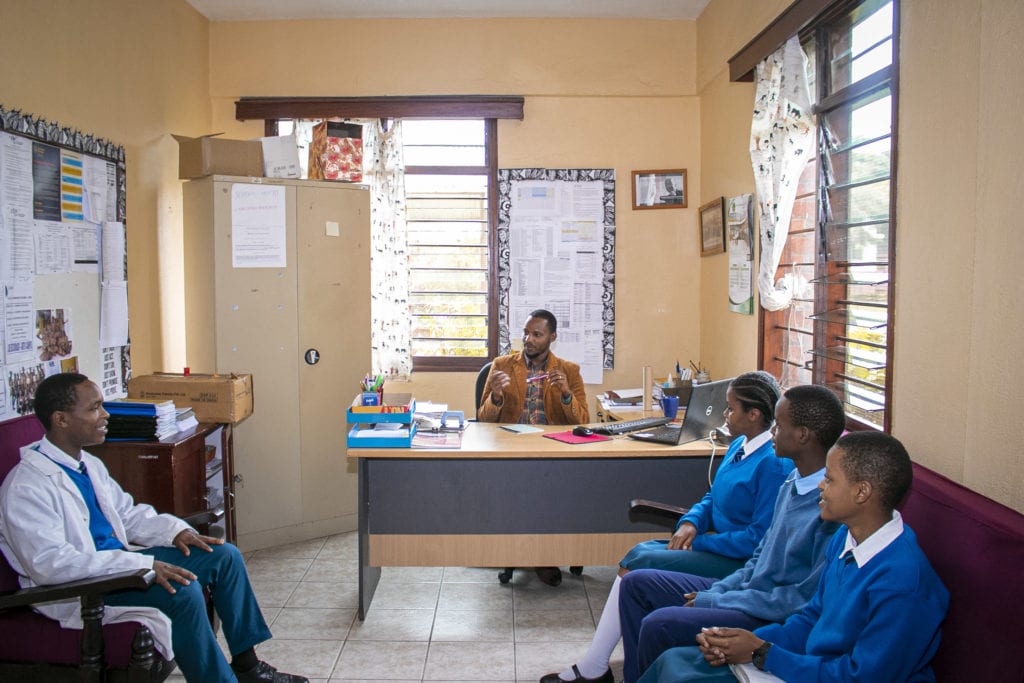
Sharing his favourite moment at St Jude’s, Mr Tsingay says he loves the Science Day, an event that’s organised annually for students to showcase their creativity in science projects.
“I enjoy the Science Day and love motivating the students to take part. Science Day is a great and transformative event for our students’ minds.”
Mr Tsingay joined St Jude’s as a fresh graduate and he’s gradually worked his way up to where he is today, crediting his achievements to the school’s environment, students and the people he has met throughout his time at the school.
St Jude’s is an equal opportunity school and encourages people from all walks of life to apply for positions at the school. The school is lucky to have teachers, like Mr Tsingay, who devote their time and knowledge to the students and work closely and cooperatively with fellow academic staff.
Long drives, bus breakdowns, walking for hours and crossing rivers on foot are just some of the experiences that The School of St Jude staff encountered while performing house checks for potential Form 1 students. However, these run-ins did not discourage them from going above and beyond the call of duty.
A house check is the final stage of the selection process after prospective students go through registration, academic entrance tests and document verification during Student Selection Day. During a house check, St Jude’s staff conduct a poverty assessment at the students’ home and interview their family to determine their level of need.
This year, staff stretched far beyond Arusha region, extending the pool of selection of bright, poor students to Kilimanjaro and Manyara regions.
Although the roads were treacherous and some of the homes were barely reachable, this did not extinguish the staff’s spirits.
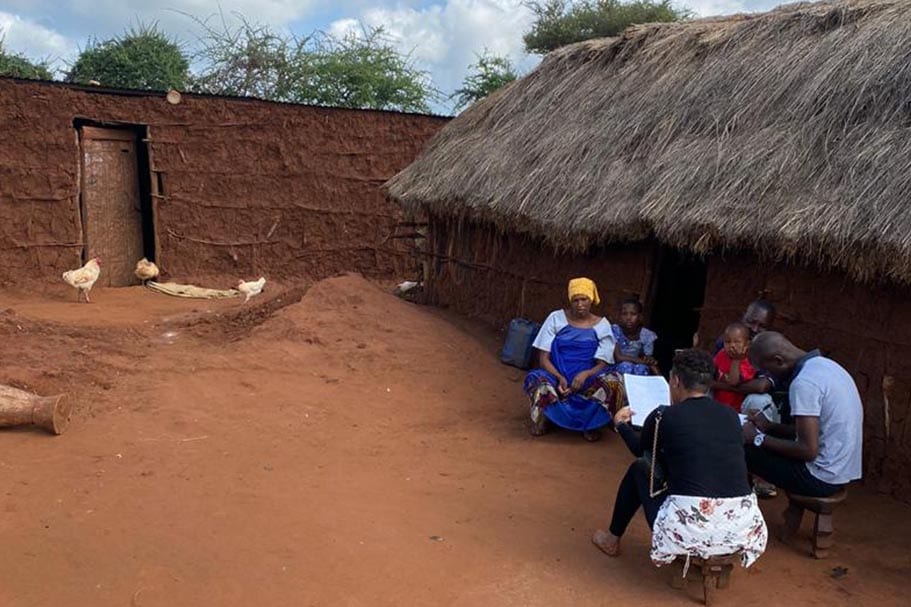
“We had to drive between 5 and 15 kilometres from one house to another. And at times we had to leave the car and walk the same distance to reach these students’ homes,” said Philip, Head of Community Relations.
Sharing his experience, Philip explained, “It was an intense and emotional experience for me. There were a lot of things that were different in comparison to our normal house checks in Arusha. We realised some people around these regions were extremely poor. Finding basic things like wooden chairs was hard in some of these homes, we had to do house checks either standing up, sitting on the floor or sitting on tree logs.”
“My highlight on this house check was when I met a man with nine children and four wives who were struggling. When we talked, he said to me that he didn’t believe in education, but after talking to teachers and as time went by, he regrets not having educated the rest of his children. To make up for his mistake, he would like to give his daughter, who is last born in the family, a chance to be educated.”
According to World Bank reports, 80% of the Tanzanian populations lives on less than AU$4.60 per day with over 45 million living below the poverty line. Beyond the persistent gaps between urban and rural areas, there are large disparities in the distribution of poverty across geographic regions.
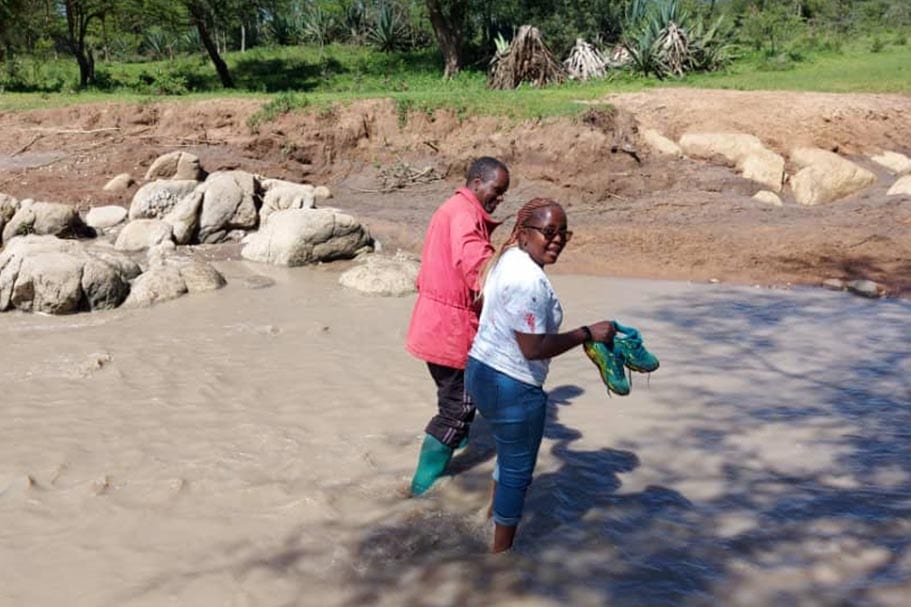
Recalling the experience, Elizabeth, Donor Relations Coordinator, uttered, “This is my second or third time doing house checks. Honestly speaking, with these faraway house checks, we saw more students who are in greater need of free, quality education which St Jude’s can provide.”
“Though we got stuck, and at some point, we were even walking on our hands and knees…” Elizabeth chuckled, “… but we had to do all that we could to select these students. To me, that was true, team spirit. It was worth it, and I will never forget that.”
“At the end of the day, it’s really fulfilling to see success stories of our students especially once you know where they are coming from, their living conditions and their family backgrounds,” Elizabeth commented with a smile.
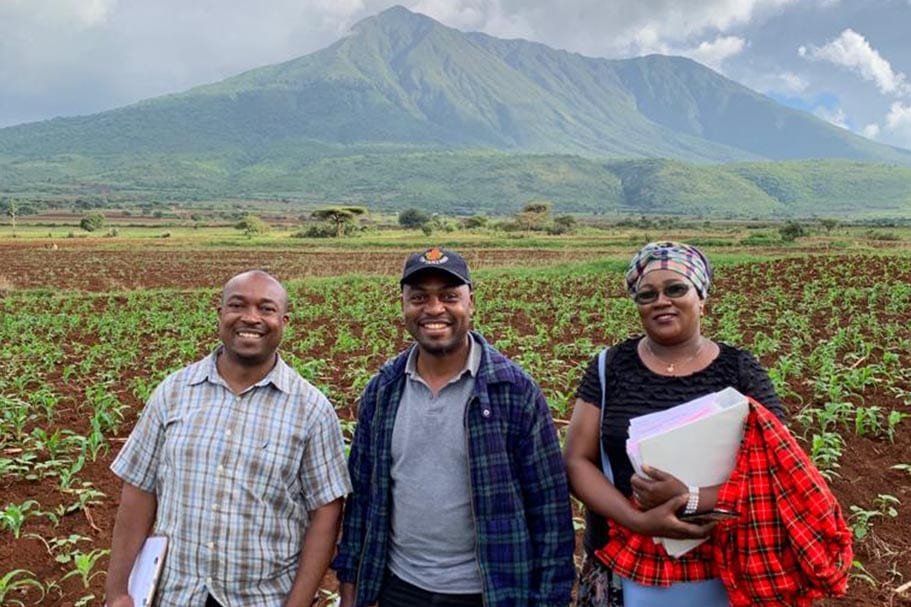
With all hands on deck, eight teams were spread across Northern Tanzania, ensuring that every student had a fair chance of being selected for an academic scholarship at St Jude’s. A team comprises a scribe, a translator, an investigator, a parent representative and a driver, each role just as important.
Noel, Database Coordinator, was one of the investigators during the house checks. He jokingly said, “I think I’ve done all the exercise I need for this year.”
“The neighbours live far apart from each other. Most of these families live in the middle of nowhere among snakes, hyenas, leopards and other wild animals. So investigating was a bit challenging. I remember I had to walk very far to look for some of these families’ neighbours,” Noel explained.
“For the students that qualified, we really delivered some good news to these families, it was the happiest moment for them,” he added.
Doing house checks this far from Arusha and for this many nights was a first and a humbling experience for St Jude’s staff.
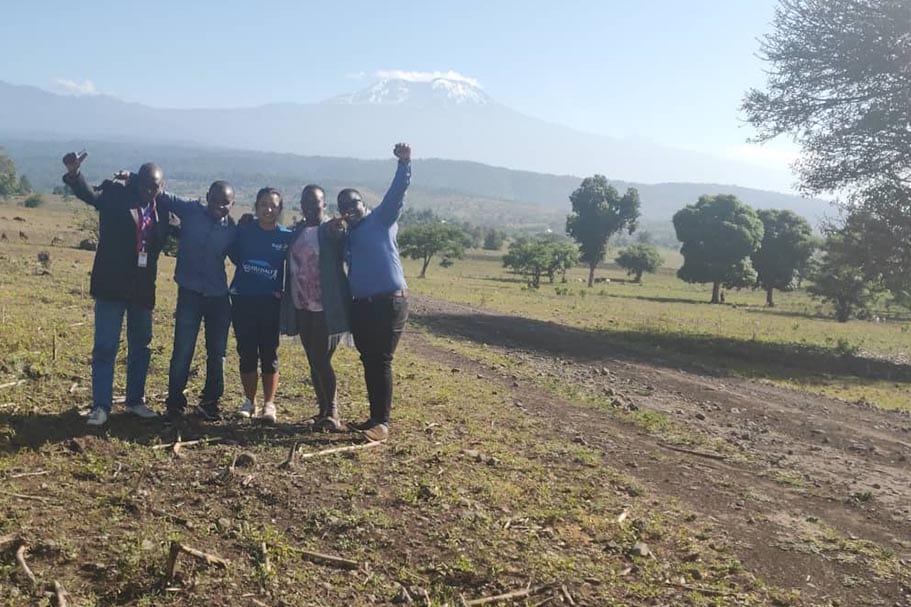
“This house check experience has taught me to be more appreciative of life. As humans, we complain over small things, but these families are poor and seem very happy,” Focus, Community Development Coordinator, described enthusiastically.
With the help of all eight House Check teams, St Jude’s successfully selected and enrolled 112 new Form 1 students who commenced their academic scholarships earlier this month. The new students, plus our existing 131 students, makes a grand total of 244 total students enrolled in Form 1 at St Jude’s this year.
St Jude’s is spreading its wings and expanding its scope, united by one mission; to educate disadvantaged, bright students in Tanzania to become the moral and intellectual leaders Tanzania needs, fighting poverty through education.
He was one of the first Beyond St Jude’s scholars to graduate university but that doesn’t mean Baba has cut any ties with St Jude's. In fact, it’s quite the opposite. After graduating from university in November last year, Baba applied for a teaching position and is now teaching mathematics and ICT at St Jude’s Girls’ Secondary School.
“I hope I can help these students to perform well and pursue their dreams,” Baba says.
Although his new position at St Jude’s is his first official employment, teaching has been a common theme throughout Baba’s educational journey.
“They say a teacher is a leader by nature. I like teaching but I didn’t start teaching here at St Jude’s, I started by teaching my young brothers and sisters at home.”
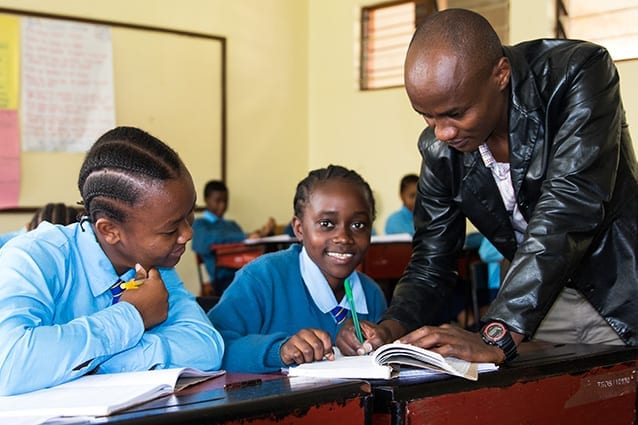
Baba grew up in his family’s Maasai boma in the district of Monduli, three hours drive from St Jude’s Girls’ Secondary School. His late father had seven wives - of which Baba’s mother is the sixth - and 49 children. Baba is the first born to his mother, with five younger siblings.
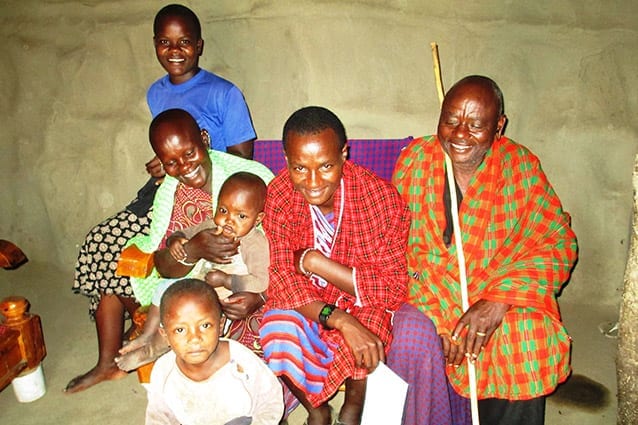
“My home was like a school in itself. During the evenings, you would find many children studying there and I would organise my siblings and teach them some lessons.”
He successfully completed his primary school education at a government school, excelling in mathematics. At secondary school, he encountered challenges, like lack of teachers, that are all too familiar for students in under resourced government schools.
“In subjects where there was not any teacher, we used to teach each other. We’d say to each other ‘you know algebra and I know fractions’, so I’d go and teach fractions and you would go and teach algebra,” he says.
“When I reached Form 4, one temporary physics teacher came to our school. I was a poor performer in physics because we had never had a physics teacher, but after he came we revised Form 3, Form 2 and Form 1 physics, trying to catch up. And I managed to pass!”
It was after receiving his above average national examination results that Baba heard about The School of St Jude and, after passing the entrance exam, was offered a place at St Jude’s for Form 5.
In May 2015 Baba graduated from Form 6 and went on to join the Beyond St Jude’s program, finding himself back in an overcrowded government school teaching mathematics during his voluntary Community Service Year.
After his Community Service Year Baba learned that he had been accepted into a Bachelor of Science with Education degree at the University of Dar es Salaam.
Inspired by the opportunities his education was affording him, he also became an active member of the University of Dar es Salaam’s Maasai Students’ Association, visiting Maasai regions and encouraging parents to take their children to school.
“We used to live in a very poor house so when I did my Community Service Year internship I used my stipend to improve it. Now I’ve managed to save some money and I’m helping my mother to build a house.”
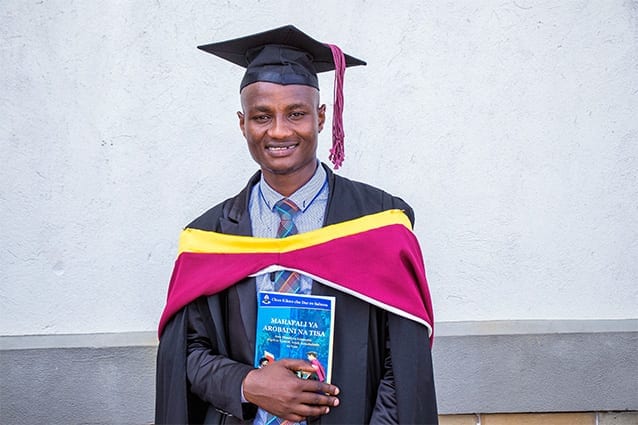
After finishing university he returned to Arusha and successfully applied for a teaching role at the girls’ secondary school.
“This school changed my life totally, I’m employed here because of the education I received and I was even able to improve my family home. I am very lucky to join here again.”
It’s 5am on a Sunday, pitch black outside, with no hint of light. Mr Somboka, the accounting teacher at St Jude’s picks up his phone to turn off his alarm, the screen glowing on his face.
Most weekends, Mr Somboka volunteers his time, going into St Jude’s to help his students.
His morning routine involves having a shower before eating his breakfast and, as the sun rises, he begins looking over his notes. Mr Somboka likes to meticulously prepare his lessons, reading absolutely everything that he can find.
At about half past nine, he says good-bye to his wife and two children, before arriving at St Jude’s just before ten o’clock.
As Mr Somboka arrives at St Jude’s, he walks towards Room 10 of Block B where fourteen of his Form 6 students are waiting for him. Today’s focus will be going over their previous exam.
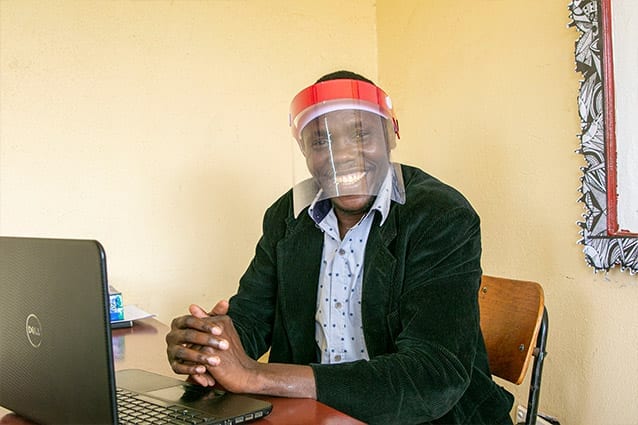
After arriving, students begin approaching Mr Somboka’s desk, he goes over each exam with them individually. Some of them come holding a letter which outlines what errors they made in the exam, and strategies they can use to improve. “After receiving the letters I sit with them one after another and we talk,” says Mr Somboka. “We find a way to solve a problem with each student.”
Last year, St Jude’s Form 6 accounting class made it into the top 10 schools in Tanzania and Mr Somboka identifies one key factor in this success.
“I came up with strategies on how students will love my subject,” he says. “Accounting is everywhere!”
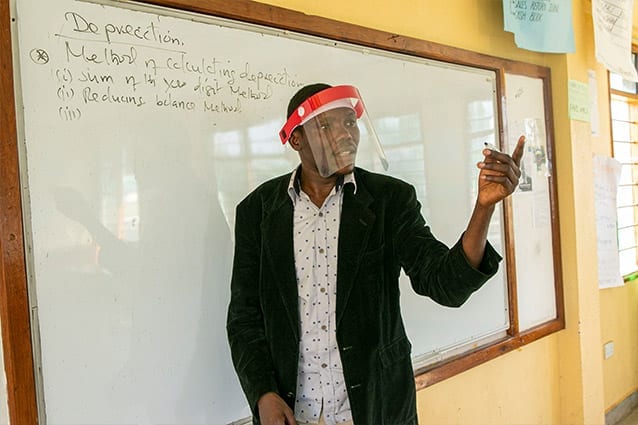
To connect with his students, Mr Somboka keeps his classes practical, relating the curriculum to the real world. “If a student’s dream is to be a business person I will ask them about managing their funds and turning a profit,” says Mr Somboka. “They’re the practical questions I ask my students.”
Mr Somboka is one of four children, his parents taught him the value of being patient and believing in yourself.
His family would work as a team, helping one another, in order to face their problems. This is an approach Mr Somboka has taken with him to St Jude’s.
“We do everything as a team, for each department,” says Mr Somboka. “If there’s a student failing a business subject, we as a department will meet and help that student." Teamwork and helping make up the spine of Mr Somboka’s teaching philosophy and are values that he passes onto his Form 6 students.
“I’m happy to see my students back in class after so long. My focus right now is to help the students cope after being home for over three months. Currently, the students are doing regional examinations and once that’s done, we will be going through all the past papers to prepare for the national examinations.”
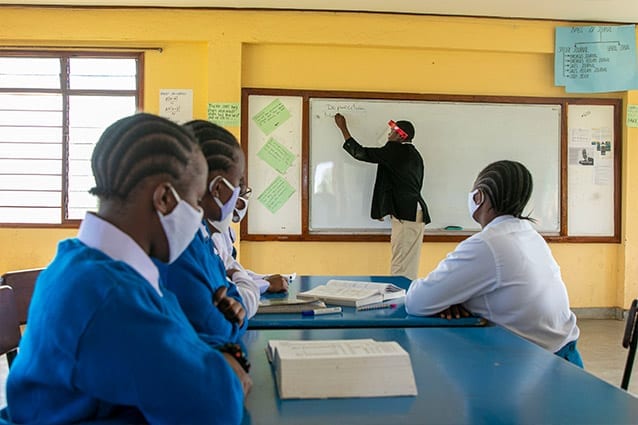
“I absolutely believe that this group of Form 6 students will make it into top 10 again because the students worked extra hard coming out of the coronavirus pandemic,” says Mr Somboka.
On some days, Mr Somboka will be sitting in his office and hear a knock at the door. The person standing at the door will be a student, seeking help on an upcoming exam or even seeking counselling on what they are going through outside of school.
“One of the problems students have involved parents who are divorced and they will be sitting in class thinking about their mum and dad,” says Mr Somboka. “I tell them that this is their parent’s problems, and it is up to them to find their own future.”
“Once they have found their own future, they can help their parents.” He added, “My advice to all students is to focus on their priorities. They should always live based on St Jude’s core values which are Respect, Responsibility, Honesty and Kindness.”